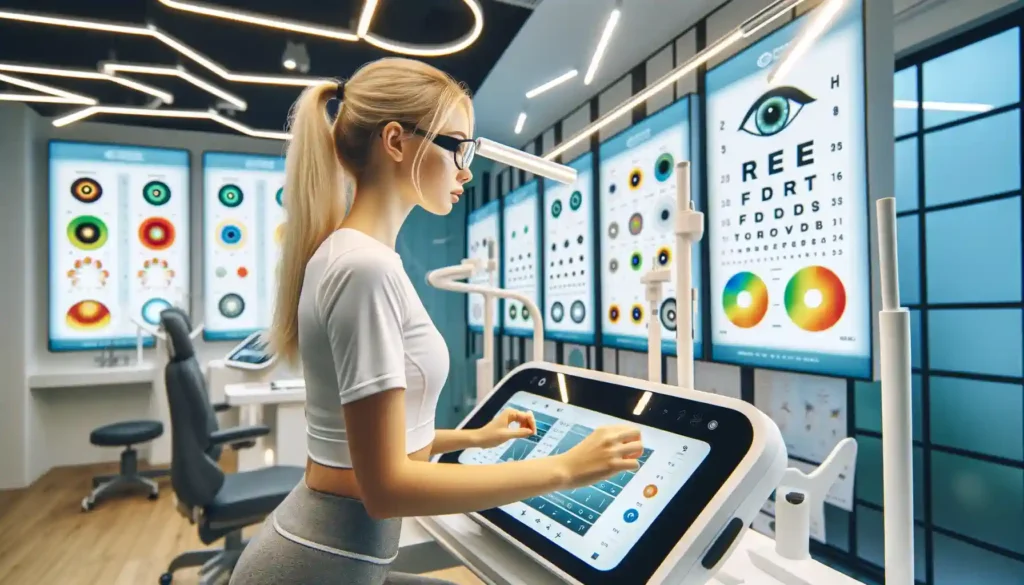Top 8 Better eyesight tips when watching Screens. It is unlikely that now you will meet a house or family that does not have at least one TV, computer, or smartphone. These electronic human assistants are, on the one hand, a great achievement of civilization and a particular good for people (for example, in self-isolation), but on the other side – enemies of eyes for modern society. This is especially true of the smartphone, or any screen.

Better Eyesight in the Digital Age
The obsession of many screen lovers with the twists and turns of all kinds of television games and quizzes, on plots of television series and television projects, and on the results of television polls and television chronicles creates a feeling of addiction. This is another way to escape from reality and its problems. What do we end up with? A sharp decline in interest in sports, outdoor activities, headaches, and visual problems.
How far TV should be from the eyes to maintain clear vision
It is known that a TV is a source of harmful radiation and electromagnetic waves. To keep yourself safe from this dangerous radiation, you need to stay as far from them as possible, limit the time of the TV, and be sure to ventilate the room where the TV screen is located.
Everyone has heard that watching TV is a significant stress on the brain and organs of vision. I thought I knew enough about this, but when I read Rainer Patslaff’s book “Frozen Eyes,” I didn’t even want to turn on the TV for a month! German scientist Patslaf on the instructions of the Ministry of Education of the Federal Republic of Germany for more than 20 years, conducted scientific research on the influence of television per person. The conclusions he drew on the basis of his own research and the developments of scientists from different countries were disappointing.
Child development and screens
In examining the impact of television on child development, Patzlaf realized: that the more a person of any age watches TV, the poorer they are knowledgeable in all areas. Moreover, scientists proved that good vision and television are simply physiologically incompatible.
Active eye movement for Better eyesight tips when watching TV
Already in the first chapter of his book, which is called “Active eyes work”, the author says that when looking at any object of the surrounding reality, a person is free in his perception, and only his own interest controls vision. Otherwise, this is the case when we look at the TV screen.
Screen Survival Guide
Let me remind you that our eyes move at a speed of about 100 times per second. Keeping up with the movement of the electron beam for any person is simply unrealistic, so a point of light rushing furiously across the screen is always ahead of our eyes. Realizing the futility of chasing a ray, the eyes fall into a passive state, and the gaze becomes numb, becomes frozen. The brain sends a signal to the eyes to stop – and the forced retinal pressure. Numbness is transmitted to the brain and the whole body. The motor begins stagnation even in the most active children.
And finally, let’s remember how TV information affects the person. Knowing that the TV is one of the most powerful media tools, we do not even suspect how great the possibilities of this informational influence are. Sociologists and psychologists have long noticed the enormous impact of television on people’s behavior and the increasing spread of fears and phobias.
There were many interesting topics for communication with family members. There is more time for reading and self-education. Here are some rules to minimize the impact on our eyesight.
Top 8 Better eyesight tips when watching screens
1. Sit at that distance from the screen (depending on your vision) so that the image is slightly blurry.
2. Look straight at the screen, not from above, below, or from the sides.
3. Blink more often, and do not hold your breath.
4. Don’t look at one point. Move your eyes across the screen.
5. In situations where the action on the screen unfolds slowly or there is an advertisement, close your eyes or turn away from the screen, and give it a rest to retinal nerves.
6. Remember to practice one at the same time mental work, as the brain aims to perform only one intellectual, visual work.
7. When visibility improves, move back from the screen to the area of fuzzy vision. Just do not do it too fast to avoid excessive eye strain.
8. Rest after every 30-50 minutes of watching screens for at least 10-15 minutes.
Vision improvement course Eyesight Academy to increase eyesight holistically

If you are tired from blurry vision and want to train your eyes to see better. Enroll in the Eyesight Academy course to improve your eye health and get better vision. With the best working eye exercises and relaxation methods, improve eye muscle shape and rebuild eye focusing ability.
Conclusion
In addition to these better eyesight tips when watching screens tips, it’s crucial to listen to your body. If you experience persistent eye discomfort, dryness, or vision problems while using screens, consult an eye care professional. They can provide personalized guidance and recommend treatments or adjustments to enhance your comfort and protect your eyesight.
By implementing these better eyesight tips when watching screens, you can significantly reduce the strain on your eyes and promote long-term eye health. Remember that maintaining healthy screen habits is essential for preserving your vision and enjoying a comfortable and productive digital experience.

